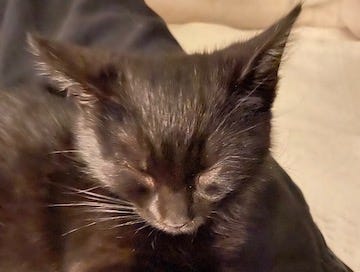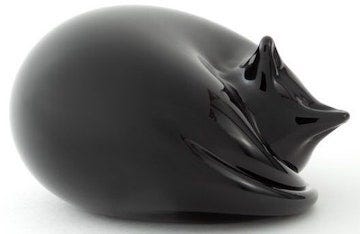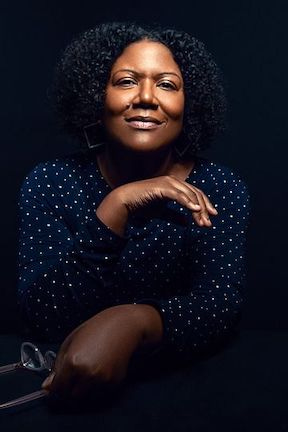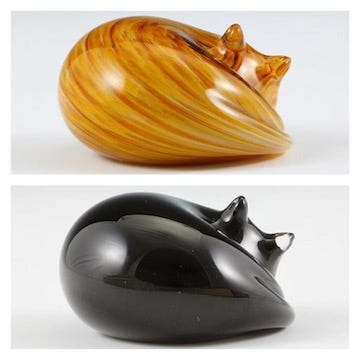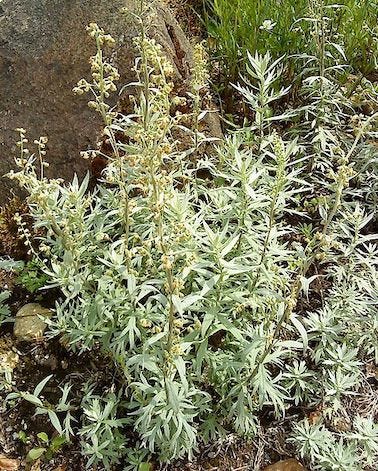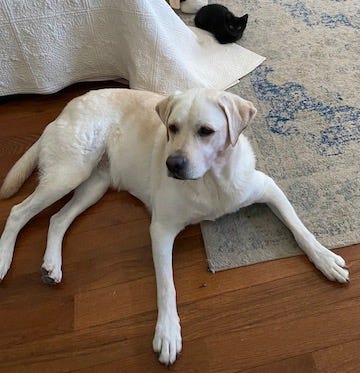Intuitive Writer Enjoys Sticking to Outline
Hello friends, I’m doing my best to honor the season of the thinning veil by reading more, writing more, and connecting in ways that feel nourishing. I’m drinking mugwort tea as I type this note, and Ida Mary (my black kitten) is napping on my lap.
In honor of Ida, the season, my ancestors, and all of you, this month I’m giving away a black sleeping cat paperweight, a little work of art from Nunwell Glass. Details below! I have an orange tabby one, and it’s a source of endless pleasure.
Building My Book
I’ve always thought of myself as the kind of intuitive writer whose outlines become obsolete as soon as I commit them to paper, but the opposite turned out to be true with Ancestor Trouble. From the start, I planned to open each section with personal stories and broaden from there. My editor, Andrea, liked that idea and encouraged me to come up with a loose order. I settled on seven parts that ended up being my guiding light from 2014 to the final draft. As I wrote, the parts deepened and interconnections between them grew. Eventually, I broke out an eighth section, about inheritance—money, wills, objects, land, sustenance, poverty, enslavement, and all the practical, emotional, and ineffable reverberations of those—when I realized it was the common element to almost everything I wanted to include that didn’t fit in the other parts.
As I wrote, I thought of the chapter headings as placeholders, titles that would do until I came up with something better, but in most cases they survived. “An Impulse to Leap,” “Grudging Kinship,” “Beneficial and Malignant Creativity”—all were quick phrases that stuck. One exception is “A Doorway,” my editor’s suggestion, from the last line of Chapter 1. Another is “Taking a Bite,” from something my friend Laila said when I interviewed her for my Harper’s piece many years ago. (The Table of Contents above is from the advance reader’s copy, which is why all the page numbers are zeroes.)
I never truly understood what writers meant when they said they wrote the book they wanted to read, until Ancestor Trouble. In my case, writing the book I wanted to read meant I had to allow myself to become the person who could and would write it. As I started out, I was already beginning to understand how modernity had created a sad, strange kinship vacuum, an absence of ancestors as a sustaining presence in (many of the white, colonized parts of) the west. I knew I needed to delve into traditions that looked to kinship and reckoning beyond the grave. I wasn’t sure exactly what kind of spiritual learnings or explorations might be required, and after a childhood among Christian evangelicals, I was afraid. I worried about writing something hackneyed or false. I worried about opening a portal I couldn’t close. I worried that in writing the book I would be slamming the door on the possibility of any intellectual argument I made, in Ancestor Trouble or elsewhere, being taken seriously ever again. But stronger than all of these worries was the commitment to what I wanted to write.
Rather than dwindling as I wrote, the sense of the importance and urgency grew. Sometimes I despaired over how long the process was taking, but I never tired of the subject. The final book, whatever its shortcomings, is even more what I wanted it to be than I knew was possible when I set out to write it. Leaning into this time of year, the old belief in the thinning of the veil between the living and the dead, helped me get where I needed to go.
Some Early Praise
I have mentioned my admiration for the work of Honorée Fanonne Jeffers at least three times in this newsletter, so imagine my astonishment and delight when I saw this in The Boston Globe: “[I’m currently reading] Maud Newton’s fantastic memoir, Ancestor Trouble. It’s well researched, well written, and juicy. I love a good juicy historical book.” The admiration is more than mutual—let me recommend her novel, The Love Songs of W.E.B. Du Bois, yet again. I read it in galley form, and then I wanted to spend more time with the characters, so I listened to the audiobook.
I thought I’d already mentioned early praise for Ancestor Trouble from other (brilliant!) writers I admire who took time from their own important work to craft the praise. Despite my social media barrage on the subject, though, apparently I forgot to thank them here. Head over to my website to see quotes (in the order received) from Abbott Kahler (who has published as Karen Abbott), Laila Lalami, Maaza Mengiste, Sarah Smarsh, and Dionne Ford. If these names sound familiar, it’s because I’ve loved their work for years.
Recommendations
Here are some things I am enjoying or recently enjoyed: Kinship: Belonging in a World of Relations; Stephanie Foo’s essay on dealing with climate anxiety in New York City by becoming a Parks Steward in (my beloved) Forest Park; Alexis Coe’s Study, Marry, Kill; Jeanna Kadlec’s Astrology for Writers; Judith Berger’s Herbal Rituals; and Isaac Fitzgerald’s walk with Alexander Chee in Hell’s Kitchen. I’ve peeked at the first pages of Joy Castro’s Flight Risk and will dive in soon. And here are some things I look forward to enjoying when they’re out: Emily St. John Mandel’s moon colony novel, Sea of Tranquility; Britni de la Cretaz’s and Lyndsey D’Arcangelo’s Hail Mary: The Rise and Fall of the National Women’s Football League; and Russian Doll, Season 2.
Cat Paperweight
I spontaneously ordered the paperweight for this giveaway last night. It should be on its way to me shortly and will be shipped out to the winner soon after it arrives. The order resulted in a $20 donation to a Western Massachusetts shelter, as all Nunwell Glass sales of black cats through Etsy apparently do, a bonus good thing.
To enter, preorder Ancestor Trouble. All preorders, whether before or after this newsletter, count. Official requests to your library to purchase the book for borrowers count, too. If you’d like a signed or personalized copy, order at Greenlight Bookstore and include the details of your request in your order comments at checkout. Send the receipt in reply to this newsletter or as a DM to me at Twitter or Instagram. Entries must be received by October 9, at 11:59 PM (Pacific). The winner will be selected at random and notified by email or (as the case may be) DM.
A Correction
A reader wrote from California to note an error in my description of mugwort: while Artemisia vulgaris is an invasive plant in the Northeast, Artemsia douglasiana (shown above) “is native to the Western half of the country (CA mugwort/Artemsia douglasiana), so definitely not a favor to the ecosystem if harvested excessively.” Noted and shared! Thank you, Jenn.
Ida and Daisy
In case you needed a photo of a black kitten and her yellow lab friend, here you go.
As always, thank you for reading.

